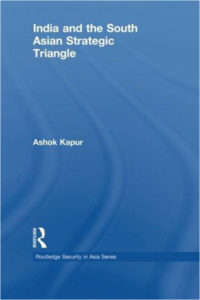
India and the South Asian Strategic Triangle
Ashok Kapur
Routledge (2016)
Rs13,589
This book traces the triangular strategic relationship of India, Pakistan and China over the second half of the twentieth century, and shows how two enmities – Sino-Indian and Indo-Pakistani – and one friendship – Sino-Pakistani – defined the distribution of power and the patterns of relationships in a major centre of gravity of international conflict and international change. The three powers are tied to each other and their actions reflect their view of strategic and cultural problems and geopolitics in a volatile area.
The book considers internal debates within the three countries; zones of conflict, including northeast and northwest south Asia, the Himalayas and the Indian Ocean; and the impact of developments in nuclear weapons and missile technology. It examines the destructive consequences of China’s harsh methods in Tibet, of China’s encouragement of military rather than democratic regimes in Pakistan, and of China’s delay in dealing with the border disputes with India. Ashok Kapur shows how the Nehru-Chou rhetoric about “peaceful co-existence” affected the relationship, and how the dynamics of the relationship have changed significantly in recent years as a range of new factors - including India’s increasing closeness to the United States - have moved the relationship into a new phase.
Ashok Kapur is Distinguished Professor Emeritus in Political Science, University of Waterloo, Canada. He is author of several major works including India - From Regional to World Power (also published by Routledge), and is co-author of Government & Politics in South Asia, 6th edition.
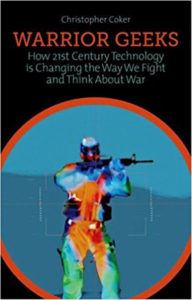
Warrior Geeks: How 21st Century Technology is Changing the Way We Fight and Think About War
Christopher Coker
Hurst (2013)
Rs4,246
Warrior Geeks examines how technology is transforming the way we think about and fight war, taking three major changes that are driving this process: cybernetic technologies that are folding soldiers into a cybernetic system that will allow the military to read their thoughts and emotions and mould them accordingly; the coexistence of men and robots in the battle-spaces of tomorrow; and the extent to which we may be able to re-engineer warriors through pharmacological manipulation. By referring back to the Greeks who defined the contours of war for us, Coker shows how we are in danger of losing touch with our humanity - the name we give not only to a species but the virtues we deem it to embody. The journey from Greeks to Geeks may be a painful one. War can only be rendered more humane if we stay in touch with the ancestors, yet unfortunately we are planning to subcontract our ethical choices to machines. In revaluing technology, are we devaluing our humanity, or the post-human condition, changing our subjectivity and thus the existential dimension of war by changing our relationship with technology both functionally and performatively?
“Do not let the almost flippant title of Christopher Coker’s Warrior Geeks fool you. The title reflects the catchy philological antithesis between science (the geeks) and philosophy (the Greeks). The resulting tension is explored in a masterly account from a very well-read humanist about the fearful advance of post-human technologies in war. ... Warrior Geeks is a brilliantly learned reflection on the ultimate amorality of a dystopian war that would have no courage, no cowardice, no patriotism, no principled pacifism, not much of anything other than casual death, a boring sort of continually rewound reality show, but on an unimaginably bloody scale.” — Victor Davis Hanson, Times Literary Supplement
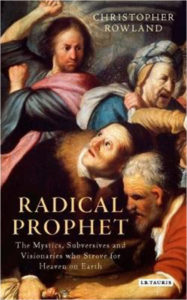
Radical Prophet: The Mystics, Subversives and Visionaries Who Foretold the End of the World
Christopher Rowland
I.B.Tauris & Co Ltd. (2017)
Rs4,246
Christianity began with the conviction that the old order was finished. The mysterious, elusive and charismatic figure of Jesus proclaimed that a new era, the Kingdom of God, was dawning. Yet despite its success, and the conversion of the empire which had executed its founder, the religion he inspired was soon domesticated, its counter-cultural radicalism tamed, as the Church attempted to control both its doctrines and its followers. Christopher Rowland here shows that this was never the whole story. At the margins, around the edges, sometimes off the religious map, the apocalyptic flame of the New Testament continued to burn. In 1649 the Diggers occupied St George’s Hill to put the egalitarianism of Christ into practice. ‘You must break these men or they will break you’, Oliver Cromwell declared of the ‘lunaticks’. This book argues that such revolutionaries had divined the true intent of the enigma who threw over the tables of the money-changers: to summon a new epoch - strange, iconoclastic, uncomfortable and otherworldly. It gives full weight to a remarkable strain of radical religion that simply refuses to die.
Christopher Rowland is Dean Ireland’s Professor Emeritus of the Exegesis of Holy Scripture in the University of Oxford. His many books include Blake and the Bible, Revelation (with Judith Kovacs), The Cambridge Companion to Liberation Theology, Christian Origins: The Setting and Character of the Most Important Messianic Sect of Judaism, and Radical Christian Writings: A Reader (with Andrew Bradstock).
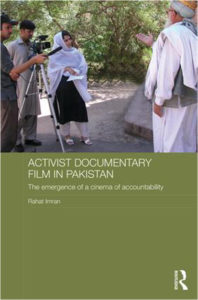
Activist Documentary Film in Pakistan: The Emergence of a Cinema of Accountability
Rahat Imran
Routledge (2016)
Rs16,137
This book, the first academic book on Pakistani documentary cinema, traces the development of activist filmmaking practices in Pakistan which have emerged as a response to the consequences of religious fundamentalism, extremism, and violation of human rights. Beginning with the period of General Zia-ul-Haq’s Islamization process (1977-88), it discusses a selection of representative documentary films that have critically addressed and documented the various key transformations, events, and developments that have shaped Pakistan’s socio-political, socio-economic, and cultural history. Such activist filmmaking practice in Pakistan is today an influential factor in addressing the politics, and negative and oppressive effects of the Islamization era, discriminatory laws, particularly gender-discriminatory Sharia laws, violation of human and citizen rights, authoritarianism, internal strife, the spread of religious fundamentalism, and the threat of Talibanization, and oppressive tribal customs and traditions. The contribution of Pakistani documentary filmmakers stands as a significant body of work that has served the cause of human rights, promoting awareness and social change in Pakistan, particularly regarding gender rights.
Rahat Imran holds a PhD in Cinema Studies from the Simon Fraser University, British Columbia, Canada. She has held a Post-doctoral Research Fellowship in the Department of Film Studies, Media Studies, and Media Education at the University of Bremen, Germany. Currently, Dr. Imran is affiliated with the Institute of Social and Cultural Studies, University of the Punjab, Lahore, Pakistan. She is completing her second book on Comparative Cinemas.
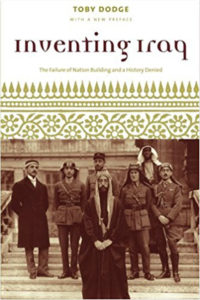
Inventing Iraq: The Failure of Nation Building and a History Denied
Toby Dodge
Columbia Uni Press (2005)
Rs4,246
If we think there is a fast solution to changing the governance of Iraq, warned U.S. Marine General Anthony Zinni in the months before the United States and Britain invaded Iraq, “then we don’t understand history.” Never has the old line about those who fail to understand the past being condemned to repeat it seemed more urgently relevant than in Iraq today, with potentially catastrophic consequences for the Iraqi people, the Middle East region, and the world. Examining the construction of the modern state of Iraq under the auspices of the British empire?the first attempt by a Western power to remake Mesopotamia in its own image?renowned Iraq expert Toby Dodge uncovers a series of shocking parallels between the policies of a declining British empire and those of the current American administration.
Between 1920 and 1932, Britain endeavored unsuccessfully to create a modern democratic state from three former provinces of the Ottoman Empire, which it had conquered and occupied during the First World War. Caught between the conflicting imperatives of controlling a region of great strategic importance (Iraq straddled the land and air route between British India and the Mediterranean) and reconstituting international order through the liberal ideal of modern state sovereignty under the League of Nations Mandate system, British administrators undertook an extremely difficult task. To compound matters, they did so without the benefit of detailed information about the people and society they sought to remake. Blinded by potent cultural stereotypes and subject to mounting pressures from home, these administrators found themselves increasingly dependent on a mediating class of shaikhs to whom they transferred considerable power and on whom they relied for the maintenance of order. When order broke down, as it routinely did, the British turned to the airplane. (This was Winston Churchill’s lasting contribution to the British enterprise in Iraq: the concerted use of air power?of what would in a later context be called “shock and awe”?to terrorize and subdue dissident factions of the Iraqi people.)
Ultimately, Dodge shows, the state the British created held all the seeds of a violent, corrupt, and relentlessly oppressive future for the Iraqi people, one that has continued to unfold. Like the British empire eight decades before, the United States and Britain have taken upon themselves today the grand task of transforming Iraq and, by extension, the political landscape of the Middle East. Dodge contends that this effort can succeed only with a combination of experienced local knowledge, significant deployment of financial and human resources, and resolute staying power. Already, he suggests, ominous signs point to a repetition of the sequence of events that led to the long nightmare of Saddam Hussein’s murderous tyranny.

